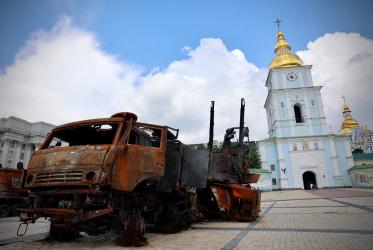* By Fredrick Nzwili
Ethiopians have celebrated the annual festival of the Meskel (which means “cross” in Amharic), marking the finding of the “true cross” on which Jesus Christ was supposedly crucified.
The festival is one of the major religious celebrations of the Orthodox Church in the Horn of Africa country. The main national feast - which occurs on 27 or 28 September - is held at Meskel Square in the capital Addis Abba.
On 27 September, senior government officials, diplomats and Orthodox Church leaders joined for the celebrations of the Damera – the lighting of the bonfires which signify the smoke that led to St Helena, the mother of Constantine the Great, to the spot where the cross was buried.
As he set ablaze the bonfire, Abune Mathias, the Patriarch of the Ethiopian Orthodox Church said the Meskel (true cross) united people through forgiveness and love. Many Ethiopians believe the bonfire cleanses sins, while others think the direction of the smoke and the way the bonfire collapses can be used to predict the future.
Abune Mathias condemned the burning of Orthodox Churches in some parts of the country and attacks on its followers. At least 25 churches have been burnt down in the past two years. While calling for peace and unity, he censured as destructive emerging divisions within the country’s Orthodox Church associated with recent demand for a synod by Oromo, the largest ethnic group in the country.
Takele Umma, deputy mayor of Addis Ababa, said that the government had not abandoned the Orthodox Church and was protecting it as mother of all Ethiopians and the home of the people’s heritage.
Anecdotes explain that in 326 AD, St Helena had embarked on a search for the cross, and succeeded after receiving direction from a dream. The dream had directed her to light a bonfire and follow the flow of the smoke to discover where the cross was buried. Soon after, she lit torches to announce her success.
Orthodox Christians in Ethiopia believe that half of the cross was given to the Ethiopian emperor Dawit by the Patriarch of Alexandra as a reward for protecting the Coptic Church members. A piece is supposedly kept in the Amba Gashen Mountains.
The festival unites families and promotes reconciliation, social cohesion and peaceful co-existence. According to reports, the feast has been celebrated in its current form for more than 600 years and in other forms since the 13th Century.
In 2013, the United Nations Educational, Scientific and Cultural Organization inscribed the festival on the Representative List of Intangible Cultural Heritage of Humanity.
* Fredrick Nzwili is an independent journalist based in Nairobi, Kenya







